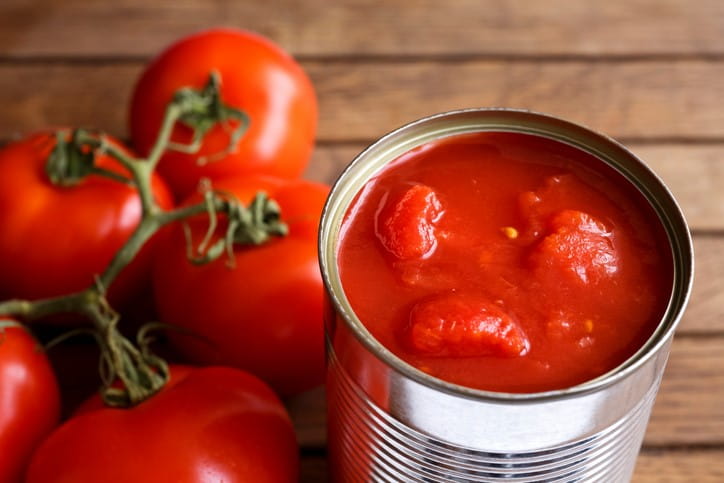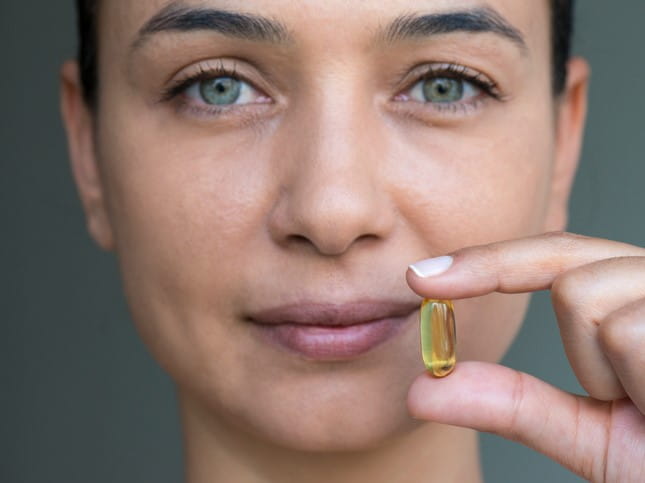What's Lycopene?

The Bottom Line
Lycopene is a carotenoid − a natural pigment that gives some vegetables and fruits their red color. There are several published studies that evaluate whether lycopene in tomato products or supplements could have protective effects against prostate cancer and cardiovascular disease. However, there is not enough evidence to say that lycopene provides such health benefits.

The Full Story
Lycopene is a carotenoid − a natural pigment that gives some vegetables and fruits their red color. It is an antioxidant (a substance that protects against cell damage). Tomatoes provide about 80% of the lycopene in the US diet. Tomatoes processed with high heat contain lycopene in a form more usable by the body than in raw tomatoes; however, heat processing can destroy other nutrients such as beta-carotene, vitamin C, and vitamin E. These are also antioxidants. Synthetic lycopene is categorized as "generally recognized as safe" by the US Food and Drug Administration, but "safe" does not mean "effective".
Does lycopene lower the risk of prostate cancer? The answer is unclear. In 2007, the World Cancer Research Fund reported that a diet high in fruits and vegetables might help reduce the risk of cancer, including lycopene for prostate cancer.
Supplemental lycopene for prevention of prostate cancer has been studied in a few randomized controlled trials (RCTs). A study that combined the results of these RCTs concluded that there was not enough evidence to support the use of lycopene supplements to prevent prostate cancer. The men in the studies did not have improvement in primary outcomes (incidence of prostate cancer and death from prostate cancer) or in secondary outcomes like changes in prostate symptoms or changes in blood concentrations of prostate specific antigen (PSA, a protein produced by the prostate gland that is often elevated in prostate cancer). Some research suggests that any beneficial effects from lycopene might actually be related to other antioxidants in the natural diet.
There is interest in the possible role of lycopene in helping prevent atherosclerosis (hardening of the arteries) that can lead to high blood pressure, heart attack, and stroke. Some studies have associated high lycopene blood concentrations with reduction of the incidence of cardiovascular disease. One study suggested that lower blood concentrations of lycopene were associated with early atherosclerosis in men. However, study results are mixed and most studies did not examine taking lycopene alone.
The body utilizes lycopene in supplements about as easily as that in food. Daily supplements of up to 120 mg of lycopene have been taken safely for up to 1 year. The appropriate dose of lycopene depends on several factors such as the user’s age and health. Some people have developed allergic skin reactions such as rashes from lycopene.
Lycopene is possibly unsafe when used during pregnancy and breastfeeding. One study of a specific lycopene supplement (LycoRed) suggested that taking lycopene 2 mg daily starting at 12-20 weeks of pregnancy and continuing until delivery might increase the rates of premature births and low birth weights. Pregnant or breastfeeding women should avoid lycopene other than that in food. There is no known safe or effective dose for lycopene in children.
If you suspect someone has swallowed lycopene and is having a problem, do not make the person vomit. Immediately check the webPOISONCONTROL® online tool for help or call Poison Control at 1-800-222-1222.
Mary Elizabeth May, RN, BA, MPH
Certified Specialist in Poison Information
Poisoned?
Call 1-800-222-1222 or
Prevention Tips
- Check with all your healthcare providers before taking lycopene. Tell them about all supplements you are taking.
- Do not take lycopene supplements during pregnancy or while breastfeeding.
- Do not take lycopene if you are sensitive or allergic to tomatoes or lycopene-containing supplements.
- “Natural” products are not necessarily safe and the dose is important. Follow directions on product labels.
- Use only USP-Verified herbal and supplement products.
This Really Happened
Case 1. A 61-year-old woman consumed 2 liters of tomato juice daily for several years and developed orange discoloration of her skin. Although there was evidence of lycopene and fatty deposits in the liver, there was no measurable liver damage. After 3 weeks on a diet free of tomato juice, the orange discoloration faded.
Case 2. A 2-year-old boy swallowed one tablet of lycopene 10 mg. His mother called Poison Control and was advised that no adverse effects were expected. When Poison Control checked with the child’s mother the next day, the boy had not developed symptoms.
For More Information
LYCOPENE [internet]. WebMD. No date. [accessed Oct 28, 2020].
References
Trumbo PR. Are there adverse effects of lycopene exposure? J Nutr. 2005 Aug;135:2060S-1S.
Poisoned?
Call 1-800-222-1222 or
Prevention Tips
- Check with all your healthcare providers before taking lycopene. Tell them about all supplements you are taking.
- Do not take lycopene supplements during pregnancy or while breastfeeding.
- Do not take lycopene if you are sensitive or allergic to tomatoes or lycopene-containing supplements.
- “Natural” products are not necessarily safe and the dose is important. Follow directions on product labels.
- Use only USP-Verified herbal and supplement products.
This Really Happened
Case 1. A 61-year-old woman consumed 2 liters of tomato juice daily for several years and developed orange discoloration of her skin. Although there was evidence of lycopene and fatty deposits in the liver, there was no measurable liver damage. After 3 weeks on a diet free of tomato juice, the orange discoloration faded.
Case 2. A 2-year-old boy swallowed one tablet of lycopene 10 mg. His mother called Poison Control and was advised that no adverse effects were expected. When Poison Control checked with the child’s mother the next day, the boy had not developed symptoms.
